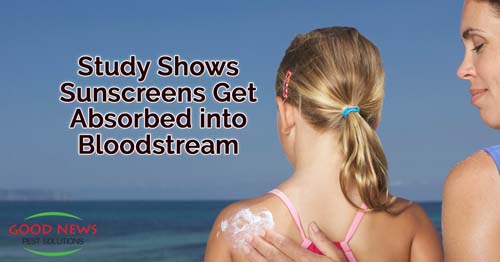
Clinical Trial Revealed Sunscreens Enter Bloodstream
There are certain dangerous constants we live with here on the Gulf Coast of Florida. Alligators. Hurricane season. Sunscreen. Wait – Sunscreen?
Thanks to our wonderful subtropical weather in the Sunshine State, we are used to lathering on sunscreen pretty much year round. Sprays, lotions, creams – we do whatever we can to protect our skin from the ever-present harmful UV rays of our sun.
After all, without sunscreen, there’s a high risk of skin cancer, even on the cloudiest days of our summer rainy season. So, the tradeoff of applying chemicals to our skin was worth it. After all, we’re just putting it on the outside, right?
But a recent clinical trial appears to prove that our assumptions about these photoprotective chemicals may have been completely without merit.
Let This Sink In
The makeup of most sunscreens hasn’t really changed all that much since the 1990’s when the Food and Drug Administration approved 16 specific physical and chemical sun blocking ingredients. Physical blockers are zinc oxide and titanium dioxide – the white stuff that never quite fades into your nose. The chemical blockers are avobenzone and oxybenzone.
You might have heard of oxybenzone recently, as there’s evidence it may be harmful to our native coral reefs. But a rapidly growing collection of anecdotal reports led the FDA to examine whether – and to what extent – oxybenzone is absorbed through the skin and into our bloodstream.
Absorbing the Truth
Not only did the clinical study find that certain sunscreen chemicals work their way past our epidermis into our bloodstream in a matter of hours, but with most applications, the chemicals stayed in our systems for up to 3 days after stopping use. Creams were the only substance that tended to exit the humans as quickly as they were soaked in.
On a positive note, the researchers say there is no definite cause for alarm yet. No evidence has been found so far that the chemicals harm the internal human body in any way. But more testing needs to be done and soon.
The FDA is also looking at new regulations. They want to determine if all currently approved sunscreen ingredients can be considered GRASE -- “generally recognized as safe and effective.” They also are looking at some new substances coming out of Europe, some of which were rejected under old guidelines.
Spread It Around
The good news is you don’t have to rely on over the counter sunscreens or their chemicals. For a few pennies more than Publix charges for Coppertone or Banana Boat, you can make your own, all-natural sunscreen. It protects just as well, smells better, and stays on your skin where the protection is needed.
As you might have noticed, Good News Pest Solutions is committed to staying green and healthy and minimizing the chemicals you interact with every day. That’s especially true of our pest control products. All of our pest control solutions are 100% organic and risk-reduced, for the safest, yet effective pest protection for your home and family.
It doesn’t matter if it’s bugs, rodents, or our other Florida constant – the mosquito. Our clients from Bradenton Beach to North Port enjoy happier, safer, pest free homes. For more information on our company or our products, just give us a call!
« Back to BlogProudly Serving
Sun City Center, Ruskin, Palmetto, Parrish, Ellenton, Bradenton, Anna Maria, Holmes Beach, Bradenton Beach, Longboat Key, Lakewood Ranch, University Park, Myakka City, Sarasota, Siesta Key, Osprey, Nokomis, Casey Key, Venice, Englewood, North Port, Port Charlotte, Punta Gorda, Arcadia
Things You Can Do
Pay Your Bill Online
Leave Us a Review
Request a Free* Termite Inspection
Stop Mosquito Bites
Get Rid of Rodents
Get a Termite Damage Warranty
Get Pest Control for Your Attic
Get Pest Control for Your Business Request Prayer
Corporate Address
1080 Enterprise Court, Ste A
North Venice, FL 34275
Call Now: (941) 412-9610
Text: (941) 412-9610
Fax: (941) 412-0080
